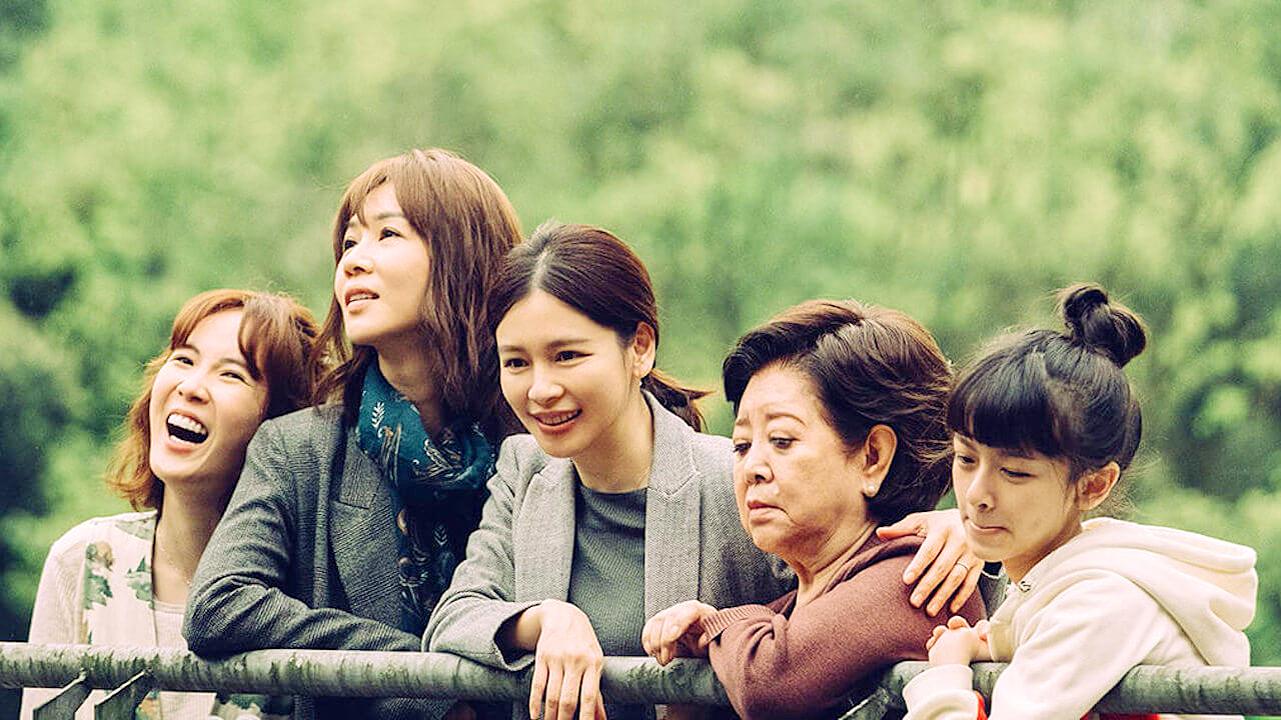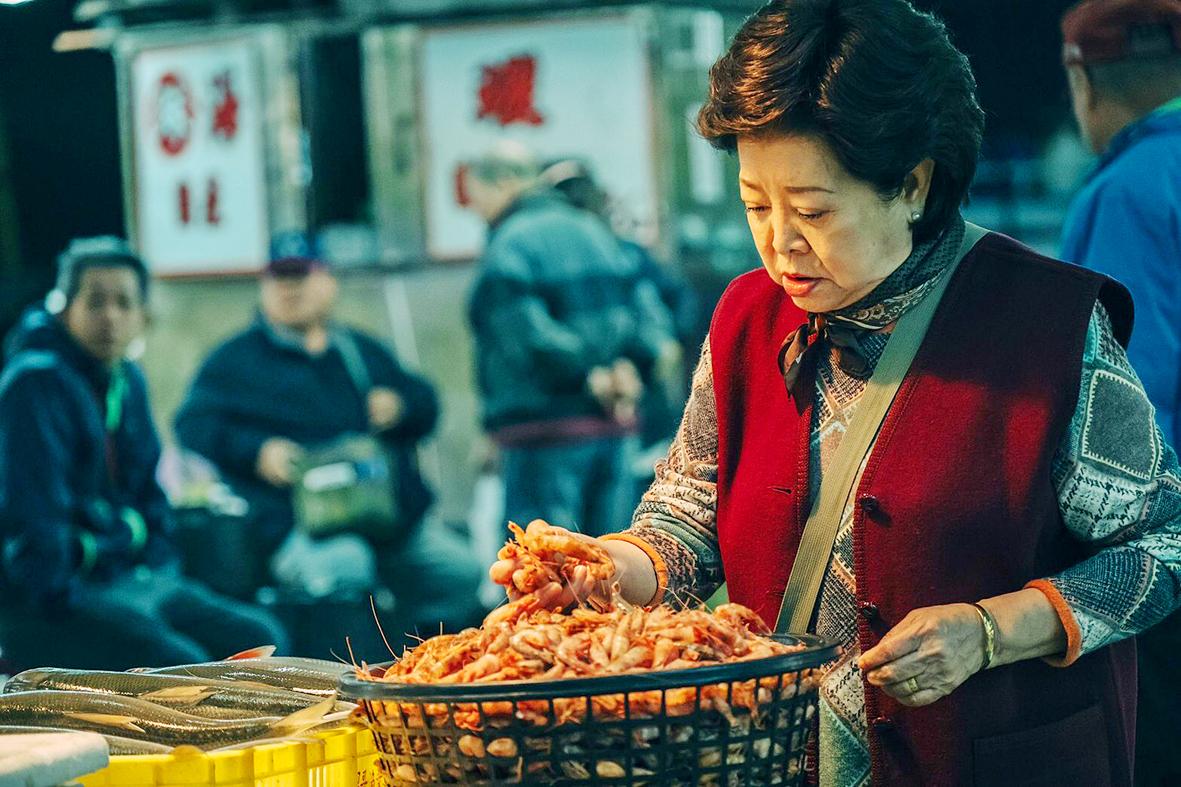The strong elderly Taiwanese woman who silently endures a life of suffering under the shackles of patriarchy is a story that’s often explored in local cinema.
The theme takes center stage in Little Big Women, which tells the story of Shoying (Chen Shu-fang, 陳淑芳), the Chen family matriarch who turned her shrimp-roll stall into a successful restaurant after her philandering husband abandoned the family decades previously. The husband’s untimely death on her 70th birthday throws upends her life as she has to arrange the funeral with her three grown daughters.
Chen, who won last year’s Golden Horse for best actress for this role, also won the best supporting actress award for Dear Tenant (親愛的房客), where she played an ill, but dignified, woman who mourns over the death of her son.

Photo courtesy of Vie Vision Pictures
Chen has a much more complex and nuanced role to work with in Little Big Women. Shoying is playful in private, first seen singing a karaoke love song in the back of a taxi, but is also extremely proud and bitter about the past. She is deeply caring but often domineering toward her three grown daughters, who don’t seem to have the best relationship with her even though she practically raised them alone to become successful adults.
The daughters each have their own issues. The oldest, Ching (Hsieh Ying-hsuan, 陳宛青), is a dance choreographer with health issues. Yu (Vivian Hsu, 徐若瑄) is a plastic surgeon, while Jiajia (Sun Ke-fong, 孫可芳) constantly clashes with her mother while learning how to run the restaurant.
Despite the father being virtually absent for most of their lives, the three often defend him and fight with their mother, which provides a somewhat hard-to-believe yet effectively heartbreaking setting and serves as the basis of the bulk of the conflicts. In one defining scene, Jiajia follows her father’s lover’s wishes and invites a Buddhist prayer chanting group to the funeral hall, while Shoying immediately counters with a rowdy ceremony with blaring suona (嗩吶, a trumpet-like instrument) music.

Photo courtesy of Vie Vision Pictures
While the acting is superb and there are some charming and genuinely moving moments, Shoying’s brooding pride and simmering resentment dominate the atmosphere, leading to a suffocating and slow-burning two hours. Just like in their lives, the daughters’ roles are overshadowed by their mother in the movie, and more focus could have been placed on their relationships with each other, and why they responded as they did to their father’s death. There’s also not much background about the father, aside from his womanizing and squandering the family’s money, which makes it hard to sympathize with the daughters who side with him.
This is director Hsu Cheng-chieh (許承傑) first feature film, developing the script from a short film of the same name, and perhaps it should have been flushed out a bit more. It’s still a strong attempt, and the complex and often-chaotic family dynamics and subtleties it presents will speak deeply to Taiwanese audiences.

June 23 to June 29 After capturing the walled city of Hsinchu on June 22, 1895, the Japanese hoped to quickly push south and seize control of Taiwan’s entire west coast — but their advance was stalled for more than a month. Not only did local Hakka fighters continue to cause them headaches, resistance forces even attempted to retake the city three times. “We had planned to occupy Anping (Tainan) and Takao (Kaohsiung) as soon as possible, but ever since we took Hsinchu, nearby bandits proclaiming to be ‘righteous people’ (義民) have been destroying train tracks and electrical cables, and gathering in villages

This year will go down in the history books. Taiwan faces enormous turmoil and uncertainty in the coming months. Which political parties are in a good position to handle big changes? All of the main parties are beset with challenges. Taking stock, this column examined the Taiwan People’s Party (TPP) (“Huang Kuo-chang’s choking the life out of the TPP,” May 28, page 12), the Democratic Progressive Party (DPP) (“Challenges amid choppy waters for the DPP,” June 14, page 12) and the Chinese Nationalist Party (KMT) (“KMT struggles to seize opportunities as ‘interesting times’ loom,” June 20, page 11). Times like these can

Dr. Y. Tony Yang, Associate Dean of Health Policy and Population Science at George Washington University, argued last week in a piece for the Taipei Times about former president Ma Ying-jeou (馬英九) leading a student delegation to the People’s Republic of China (PRC) that, “The real question is not whether Ma’s visit helps or hurts Taiwan — it is why Taiwan lacks a sophisticated, multi-track approach to one of the most complex geopolitical relationships in the world” (“Ma’s Visit, DPP’s Blind Spot,” June 18, page 8). Yang contends that the Democratic Progressive Party (DPP) has a blind spot: “By treating any

Swooping low over the banks of a Nile River tributary, an aid flight run by retired American military officers released a stream of food-stuffed sacks over a town emptied by fighting in South Sudan, a country wracked by conflict. Last week’s air drop was the latest in a controversial development — private contracting firms led by former US intelligence officers and military veterans delivering aid to some of the world’s deadliest conflict zones, in operations organized with governments that are combatants in the conflicts. The moves are roiling the global aid community, which warns of a more militarized, politicized and profit-seeking trend